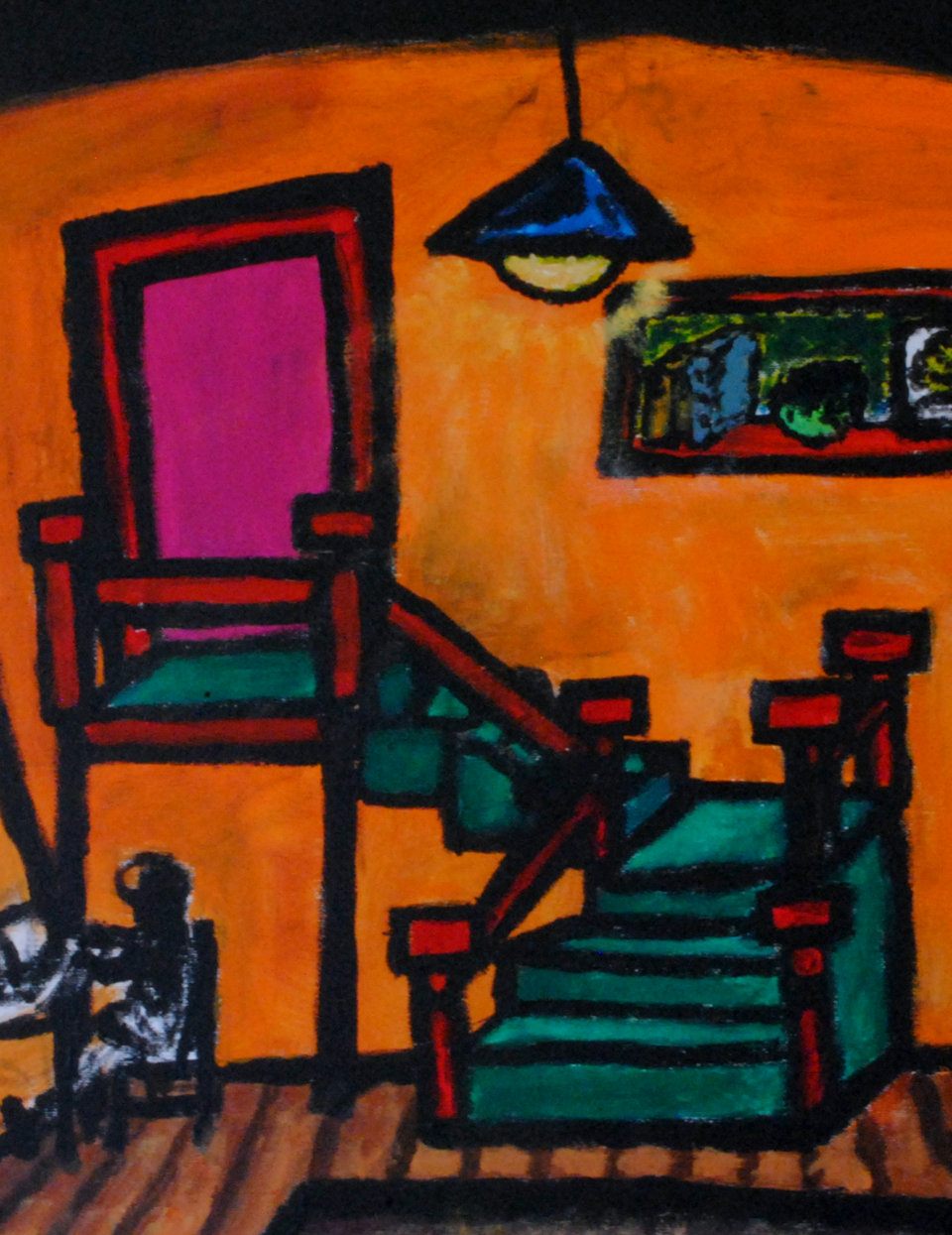“Who Really Works at Internal Affairs?”
The letters on the frosted glass read INTERNAL AFFAIRS, or at least they used to. Now it looked more like IN…ER…AL …FAIRS, the remaining flakes of gold leaf winked ironically at passersby, reflecting a faded grandeur that might once have convinced someone of something important.
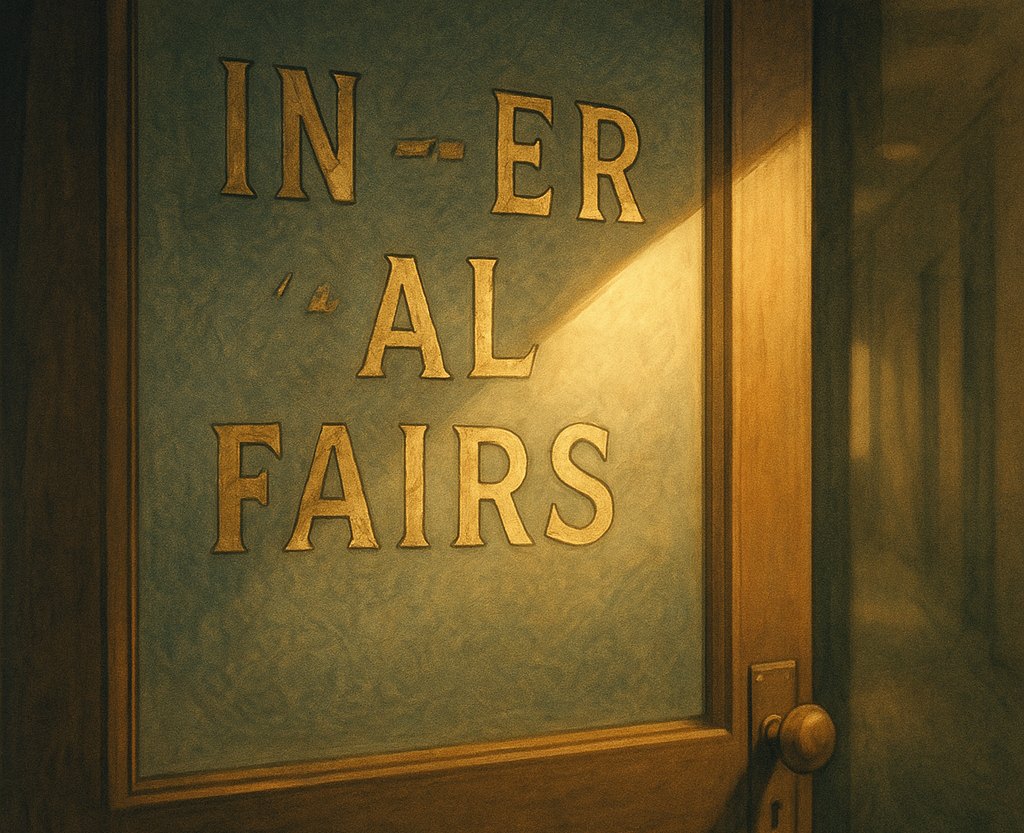
The letters on the frosted glass read INTERNAL AFFAIRS, or at least they used to. Now it looked more like IN…ER…AL …FAIRS, as if the missing letters had decided to take early retirement. On sunny afternoons, the remaining flakes of gold leaf winked ironically at passersby, reflecting a faded grandeur that might once have convinced someone of something important. Now it mostly suggested a budget shortfall.
Inside, the air was an anthology of minor miseries—yesterday's cigarette smoke, the damp perfume of old paperwork, and toner ink from a printer that believed reincarnation was the path to job satisfaction. The radiator sputtered quietly in the corner, murmuring obscure threats in a language known only to plumbing.
At the desk sat the man known only as "Internal Affairs." It wasn't that people didn't know his name—they must have, at some point—but it had become more comfortable not to use it, a kind of professional courtesy extended to men whose primary function is keeping secrets. He wore a tie the color of regret, knotted with precision. A clean folder sat exactly two inches from the edge of the desk, centered beneath a lamp that produced more shadow than light. It contained nothing yet. Nothing but possibility.
The phone on his desk rang twice, as if checking first to see if it had permission.
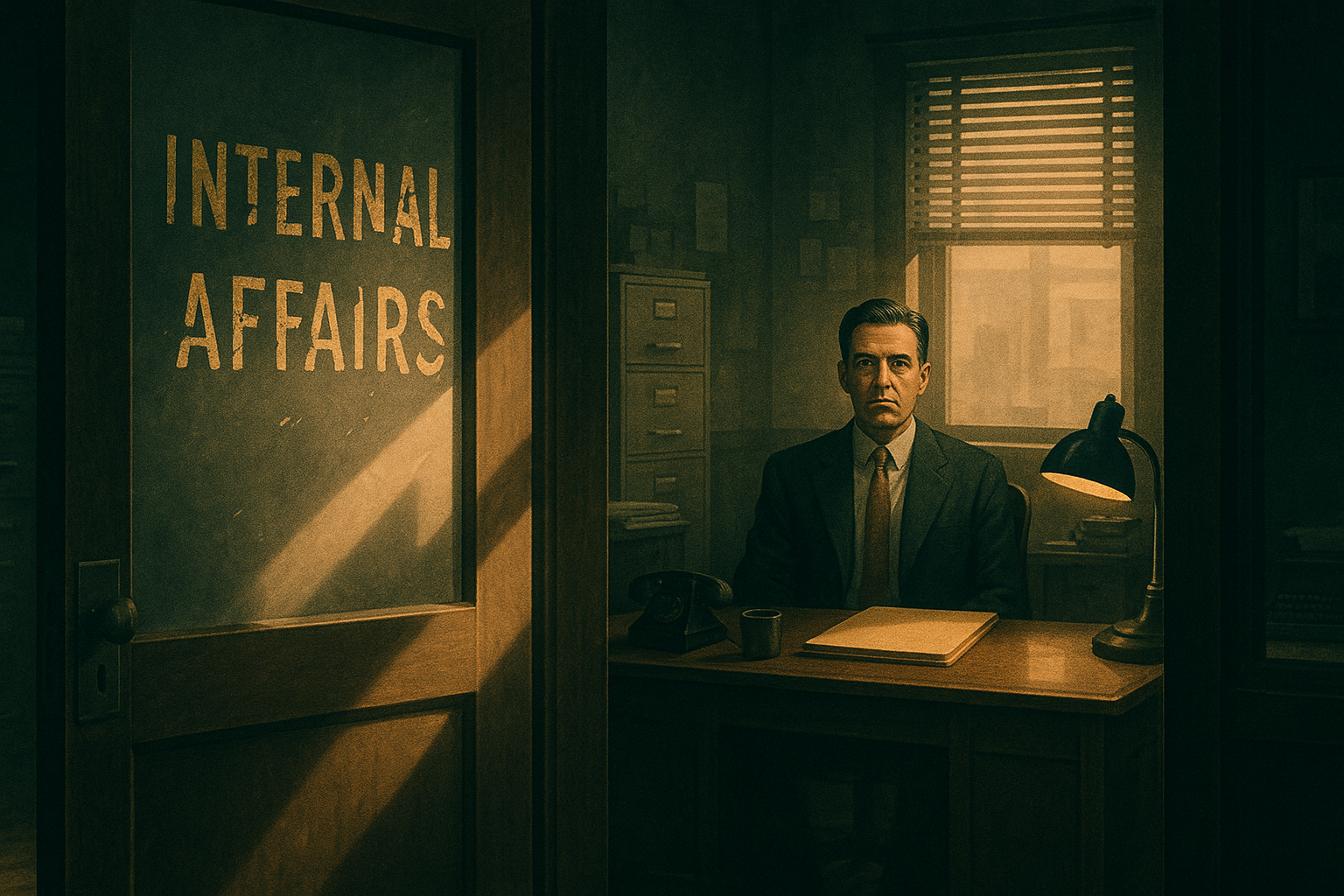
“Internal Affairs,” he answered softly.
A voice murmured on the other side, nervous enough to suggest it had called the wrong number on purpose.
“Yes,” he replied, “he’s expected. I’ll take care of it.”
He returned the receiver to its cradle with the practiced gentleness of someone disarming an explosive. He leaned back in his chair, contemplating the empty folder like a chessboard with no pieces. The room took a slow breath around him: a distant paper trimmer in rhythmic execution down the hall, a muffled curse from Eldrid’s typewriter as it punched through a sentence, and the sighing creak of the office itself, as though the walls were tired of eavesdropping.
He opened his desk drawer and considered the supplies: four black pens, one red pen, one pencil, and a half-empty packet of mints that nobody ever touched. He closed it again. In his experience, people felt more comfortable confessing their sins to someone with an immaculate desk. A mess implied a sympathetic ear, and that wouldn't do.
A shadow hovered outside the frosted door, shifting nervously as if debating whether to knock or simply run. The IA man waited, counting the seconds. Four…five…six. Good, he thought. The indecisive ones talked the most.
The shadow firmed, hand grasping the doorknob, and the door swung open to reveal Dag Sandholt. Dag entered the room with the measured enthusiasm of someone summoned for jury duty. He glanced at the chair, then at the IA man, whose neutral expression said nothing about the quality of the seating.
“Mr. Sandholt,” Internal Affairs said evenly. “Take a seat.”
Dag obeyed. The chair squeaked as though protesting its innocence.
“Explain to me what happened today,” Internal Affairs continued. He didn’t open the folder. He let it sit empty, a threat or promise yet unfulfilled. “You had…an incident.”
Dag shifted slightly, trying to find a more honest posture. “It started at my desk,” he said finally. “Before coffee. After confidence.”
He paused, hoping perhaps this would explain everything. Internal Affairs did not appear convinced.
“Hampus called,” Dag went on. “You know Hampus.”
Internal Affairs raised an eyebrow in silent confirmation. Everybody knew Hampus, even people who didn’t.
“Hampus said, ‘Dag, you’re going on Facebook. Personal account. Immediately.’ And then he hung up. It felt like getting instructions from a particularly aggressive fortune cookie.”
Dag leaned forward, elbows on knees, gaze fixed on the floor as though the linoleum tiles might provide helpful annotations. “So I opened the page,” he said, sighing softly. “You know the one. Smiling faces, gentle gradients, the illusion of easy connection—all designed by someone with an impeccable sense of irony.”
Internal Affairs nodded, not to encourage, but to show he had heard of Facebook once, though strictly by accident.
Dag continued. “The form was innocent enough at first. Name? Dag Sandholt. Occupation? Publisher. Birthday? Optimistically, I still have one. Gender?” Dag hesitated, then smiled ruefully. “‘Prefer not to say.’ A refusal that felt surprisingly good. But then…things got difficult.”
Internal Affairs waited. He knew things always got difficult. They wouldn’t be sitting here otherwise.
“They wanted a profile picture,” Dag said, shaking his head. “I gave them the RABAGAS wordmark. Then they asked for a cover photo, so I used our banner. It’s nice, you know? It says we mean it in colors.”
Internal Affairs made a note, though Dag couldn’t see exactly where. Probably a mental filing cabinet, thought Dag, somewhere next to 'questionable taste in fonts' and 'excessive metaphor use.'
“Then came the bio,” Dag sighed deeply. “I wrote one in Norwegian—simple, honest, minimal. Publisher at RABAGAS. Holder økonomien i live og resten i sjakk. But then I wrote one in English, too. More playful. ‘Spreadsheet whisperer, believer in artistic freedom, cold beer, and never accepting a friend request from your boss.’”
Dag paused to gauge Internal Affairs’ reaction. There was none. It was like trying to read a poker player who didn’t realize he was at a card table.
“And then?” Internal Affairs prompted gently.
Dag took a deep breath. “They asked for a video selfie. To ‘verify my identity.’ I clicked record, but something happened. The screen froze just as I blinked. And that’s the image they reviewed—me, blinking in existential dread. It was like being judged by a panel of exes who all have notes.”
A small silence grew between them, thick enough for the radiator’s muttering to intrude briefly.
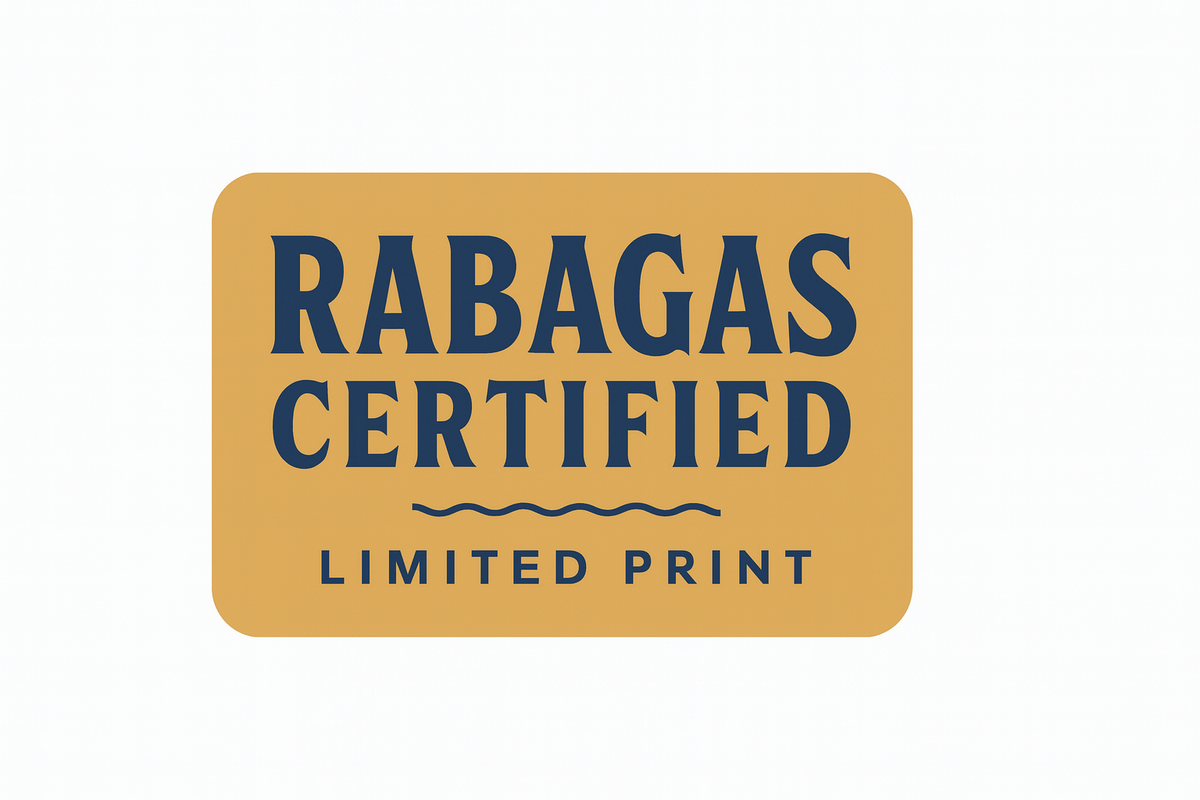
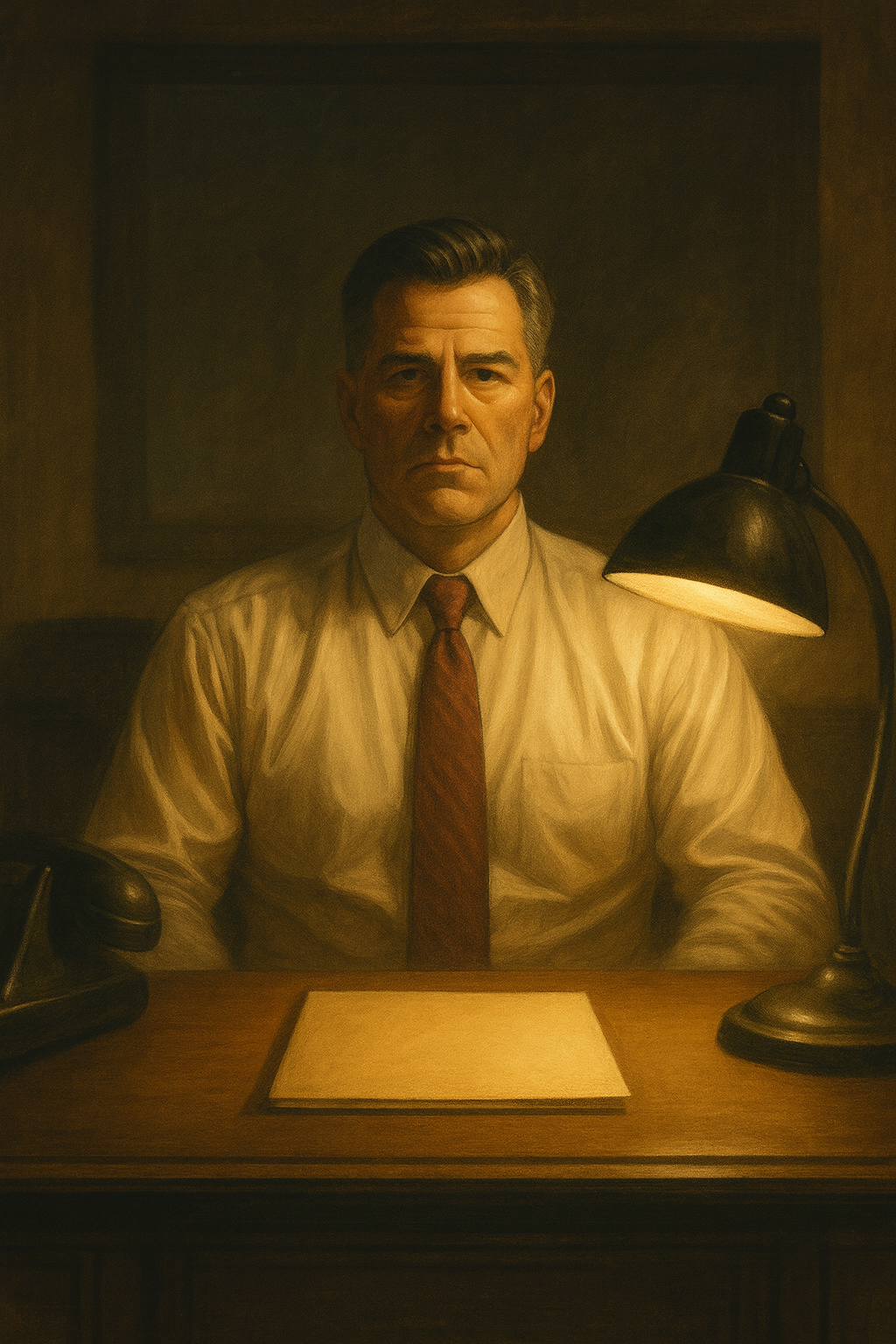
“Go on,” Internal Affairs urged.
“I went to the break room to wait it out,” Dag continued. “Ulrikk was there. The coffee machine was fighting back, again, like a sentient hostage-taker. Ulrikk was advising it on its ‘aesthetic shortcomings.’ We talked about Facebook. Ulrikk doesn’t approve of sans serif fonts—thinks they imply commercialism. ‘Use serif,’ he said. ‘It implies history, authenticity.’”
Dag laughed softly. “But then he warned me: ‘Facebook isn’t a platform. It’s a mirror with a clipboard. They're not checking if you exist—they’re deciding if you should.’”
Dag shook his head. “Still, I felt…curious. A bit hopeful. I went back to my desk, recorded another video selfie—tried looking more authentic this time, less like I was confessing under duress.”
Internal Affairs nodded slowly, silently acknowledging the futility of such an exercise.
Dag continued, “I uploaded it. Set up the magazine’s Page. Category: Magazine. URL: rabagasmagazine.no. Mission statement: ‘An independent cultural detonator disguised as a magazine.’ Clicked ‘Create Page’.”
He sighed, deeper now, carrying existential fatigue. “That’s when they shut me out. ‘We’ve temporarily restricted your account.’ No explanation. No bullet points, no appeal. Just an impersonal silence.”
He smiled ruefully. “I appealed anyway. Of course, I did. Another video, another polite refusal. Eventually, they upgraded me to permanently disabled. An oddly comforting phrase, somehow.”
Internal Affairs watched Dag silently. He hadn’t written a single word yet, and somehow that seemed worse.
“So,” Dag concluded, “that’s why I’m here. I attempted digital existence, and the digital existence politely declined.”
Internal Affairs leaned back, folding his hands. The silence extended, making itself comfortable.
“Did you learn anything?” he finally asked.
Dag laughed softly. “Maybe that I’m not cool enough for the Face-gang. Maybe that you shouldn’t believe in platforms that smile too much.”
Internal Affairs considered this thoughtfully. He opened the empty folder, made a small note, and closed it again.
“You’re free to go, Mr. Sandholt,” he said quietly. “I’ll…take care of it.”
Dag stood, glancing briefly at the inscrutable folder before leaving the room. Out in the hallway, life was moving again. Ragna was waving printouts triumphantly, shouting something about Ghost updates bypassing Facebook entirely.
Internal Affairs stayed behind, the room quiet again. He looked at the folder marked “Sandholt, D. / Social Verification / Unresolved” and placed it carefully atop a stack of identical files.
The radiator clicked, the walls sighed, and the phone in the corner—red, heavy, and never called lightly—rang once. He listened briefly, responded once, and hung up again.
Somewhere outside, gold letters peeled a little more from glass that had stopped pretending to mean anything.




